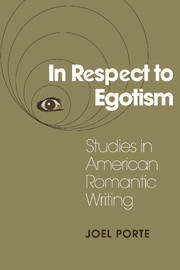Book contents
- Frontmatter
- Contents
- Preface
- Acknowledgments
- In Respect to Egotism
- Introduction: Writing, Reading, Romanticism
- 1 “Where … Is This Singular Career to Terminate?”: Bewildered Pilgrims in Early American Fiction
- 2 “Where There Is No Vision, the People Perish.…”: Prophets and Pariahs in the Forest of the New World
- 3 Poe: Romantic Center, Critical Margin
- 4 Emerson: Experiments in Self-Creation
- 5 Hawthorne: “The Obscurest Man of Letters in America”
- 6 Thoreau's Self-Perpetuating Artifacts
- 7 Melville: Romantic Cock-and-Bull; or, The Great Art of Telling the Truth
- 8 Douglass and Stowe: Scriptures of the Redeemed Self
- 9 Whitman: “Take Me as I Am or Not at All.…”
- Interchapter: Walt and Emily
- 10 Dickinson's “Celestial Vail”: Snowbound in Self-Consciousness
- Notes
- Index
- CAMBRIDGE STUDIES IN AMERICAN LITERATURE AND CULTURE
4 - Emerson: Experiments in Self-Creation
Published online by Cambridge University Press: 24 March 2010
- Frontmatter
- Contents
- Preface
- Acknowledgments
- In Respect to Egotism
- Introduction: Writing, Reading, Romanticism
- 1 “Where … Is This Singular Career to Terminate?”: Bewildered Pilgrims in Early American Fiction
- 2 “Where There Is No Vision, the People Perish.…”: Prophets and Pariahs in the Forest of the New World
- 3 Poe: Romantic Center, Critical Margin
- 4 Emerson: Experiments in Self-Creation
- 5 Hawthorne: “The Obscurest Man of Letters in America”
- 6 Thoreau's Self-Perpetuating Artifacts
- 7 Melville: Romantic Cock-and-Bull; or, The Great Art of Telling the Truth
- 8 Douglass and Stowe: Scriptures of the Redeemed Self
- 9 Whitman: “Take Me as I Am or Not at All.…”
- Interchapter: Walt and Emily
- 10 Dickinson's “Celestial Vail”: Snowbound in Self-Consciousness
- Notes
- Index
- CAMBRIDGE STUDIES IN AMERICAN LITERATURE AND CULTURE
Summary
“The history of the genesis,” Emerson notes, is the “old mythology” that
… repeats itself in the experience of every child. He too is a demon or god thrown into a particular chaos, where he strives ever to lead things from disorder into order. Each individual soul is such, in virtue of its being a power to translate the world into some particular language of its own.
Emerson's description here of that poetic process whereby each youth seeks to inscribe his own fable of renewal is a fair portrayal of how a lapsed Unitarian minister in 1836 attempted to recuperate his powers by opening a literary discourse with the world. Emerson, Santayana notes, “was like a young god making experiments in creation.” Nature, accordingly, represents Emerson's initial effort at “restoring to the world original and eternal beauty” by redeeming and reconstituting his own soul in an imaginative apocalypse.
Stephen Whicher remarks that Emerson's first book “might have exchanged titles with Poe's Eureka,” That, however, is just about all these two odd treatises might be said to have in common. Poe's “apocalypse“ is the revelation of a cosmos in decline, its stars dead or dying, burning on through light-time in paradoxical celebration of their fate. Coming at the end of Poe's painful career, it prophesies his own expiration by figuring that of the universe. But Emerson had no intention of singing a sad tale of the Conqueror Worm. His worm is mounting “through all the spires of form” on its triumphant way to becoming human.
- Type
- Chapter
- Information
- In Respect to EgotismStudies in American Romantic Writing, pp. 106 - 123Publisher: Cambridge University PressPrint publication year: 1991



